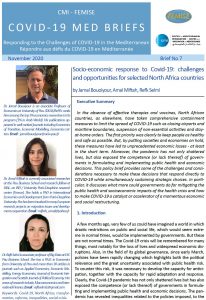
The recent coronavirus crisis threatens the health, economies and societies of all countries. In Southern and Eastern Mediterranean countries, the fight against the pandemic is even more complicated. Cooperation and EU-Med strategies in key sectors are needed. Therefore, the Center for Mediterranean Integration (CMI) and FEMISE join forces and launch their joint series of Policy Briefs called “COVID-19 MED BRIEFS” to pave the way for thematic analyses and policy relevant recommendations.
The seventh COVID-19 MED BRIEF, entitled “Socio-economic response to Covid-19: challenges and opportunities for selected North Africa countries” by Jamal Bouoiyour, Amal Miftah and Refk Selmi is available here.
 Summary: In the absence of effective therapies and vaccines, North African countries, as elsewhere, have taken comprehensive containment measures to limit the spread of COVID-19 such as closing airports and maritime boundaries, suspension of non-essential activities and stay-at-home orders. The first priority was clearly to keep people as healthy and safe as possible. But, by putting societies and economies on hold, these measures have led to unprecedented economic losses – at least in the short term. Moreover, the pandemic has not only shattered lives, but also exposed the competence (or lack thereof) of governments in formulating and implementing public health and economic decisions.
Summary: In the absence of effective therapies and vaccines, North African countries, as elsewhere, have taken comprehensive containment measures to limit the spread of COVID-19 such as closing airports and maritime boundaries, suspension of non-essential activities and stay-at-home orders. The first priority was clearly to keep people as healthy and safe as possible. But, by putting societies and economies on hold, these measures have led to unprecedented economic losses – at least in the short term. Moreover, the pandemic has not only shattered lives, but also exposed the competence (or lack thereof) of governments in formulating and implementing public health and economic decisions.
This policy brief provides some of the challenges and considerations necessary to make these decisions that respond directly to COVID-19 while simultaneously sustaining strategic choices. In particular, it discusses what more could governments do for mitigating the public health and socioeconomic impacts of the health crisis and how to make COVID-19 a catalyst or accelerator of a momentous economic and social restructuring.
This Policy Brief is produced as part of the series of Policy Briefs on « Responding to the Challenges of COVID-19 in the Mediterranean » that is undertaken in partnership between FEMISE and the Center for Mediterranean Integration (CMI).
The views expressed in this Brief are those of the authors and do not reflect the views of CMI or FEMISE. The contents have not been subjected to verification by CMI or FEMISE and their publication does not reflect ownership by CMI or FEMISE.

